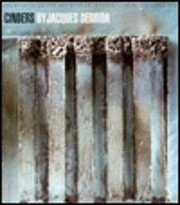

Fai clic su di un'immagine per andare a Google Ricerca Libri.
|
Sto caricando le informazioni... Cindersdi Jacques Derrida
 Nessuno Sto caricando le informazioni...
Iscriviti per consentire a LibraryThing di scoprire se ti piacerà questo libro. Attualmente non vi sono conversazioni su questo libro. Nessuna recensione nessuna recensione | aggiungi una recensione
Appartiene alle SeriePosthumanities (28)
" "More than fifteen years ago," Jacques Derrida writes in the prologue to this remarkable and uniquely revealing book, "a phrase came to me, as though in spite of me. It imposed itself upon me with the authority, so discreet and simple it was, of a judgment: cinders there are (il y a là cendre). I had to explain myself to it, respond to it--or for it." In Cinders Derrida ranges across his work from the previous twenty years and discerns a recurrent cluster of arguments and images, all involving in one way or another ashes and cinders. For Derrida, cinders or ashes--at once fragile and resilient--are "the better paradigm for what I call the trace--something that erases itself totally, radically, while presenting itself." In a style that is both highly condensed and elliptical, Cinders offers probing reflections on the relation of language to truth, writing, the voice, and the complex connections between the living and the dead. It also contains some of his most essential elaborations of his thinking on the feminine and on the legacy of the Holocaust (both a word--from the Greek holos, "whole," and kaustos, "burnt"--and a historical event that invokes ashes) in contemporary poetry and philosophy. In turning from the texts of other philosophers to his own, Cinders enables readers to follow the trajectory from Derrida's early work on the trace, the gramma, and the voice to his later writings on life, death, time, and the spectral. Among the most accessible of this renowned philosopher's many writings, Cinders is an evocative and haunting work of poetic self-analysis that deepens our understanding of Derrida's critical and philosophical vision. "-- Non sono state trovate descrizioni di biblioteche |
Discussioni correntiNessunoCopertine popolari
 Google Books — Sto caricando le informazioni... Google Books — Sto caricando le informazioni...GeneriSistema Decimale Melvil (DDC)401.41Language Language Philosophy and theory Communication; semantics, pragmatics, languages for special purposes Discourse analysisClassificazione LCVotoMedia: (3.6) (3.6)
Sei tu?Diventa un autore di LibraryThing. |
||||||||||||||||||||||||||||||||||||||||||||||||||||||||||||||||||||||||||||||||||||||||||||||||||||||||||||||||||||||||